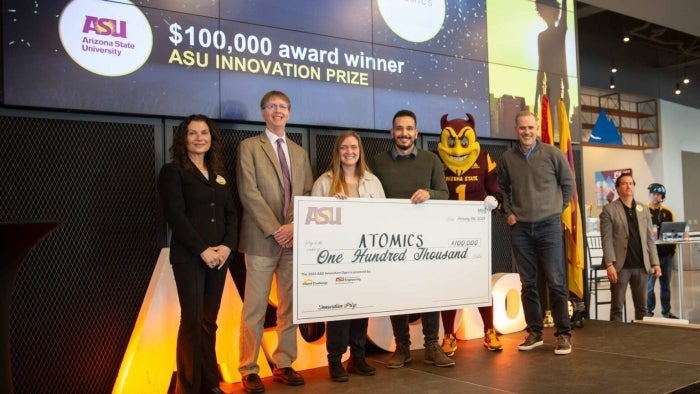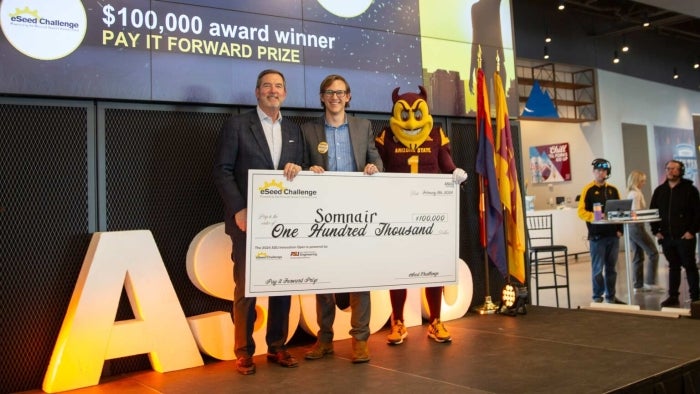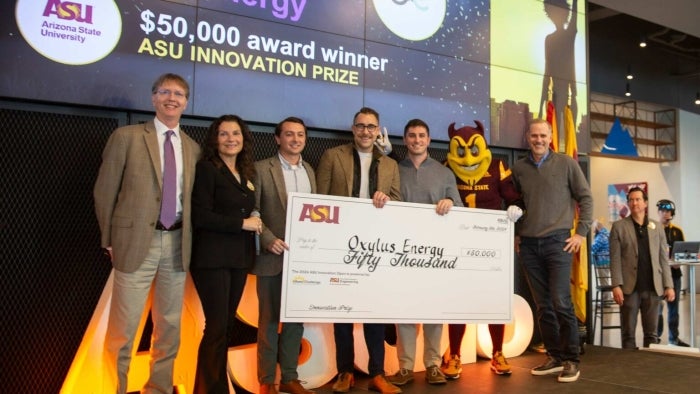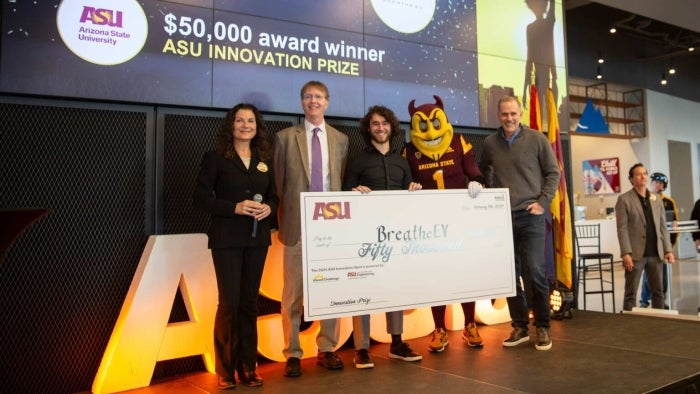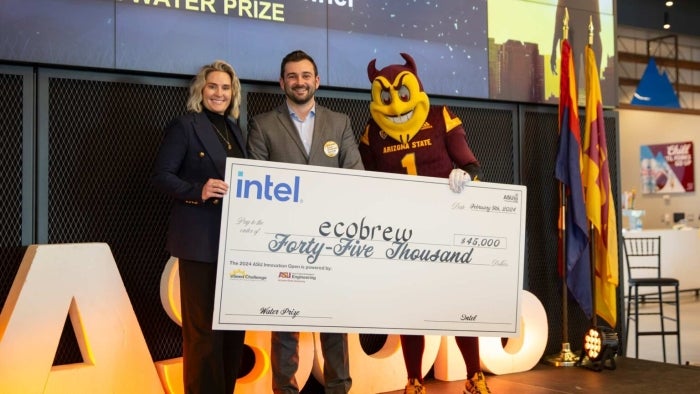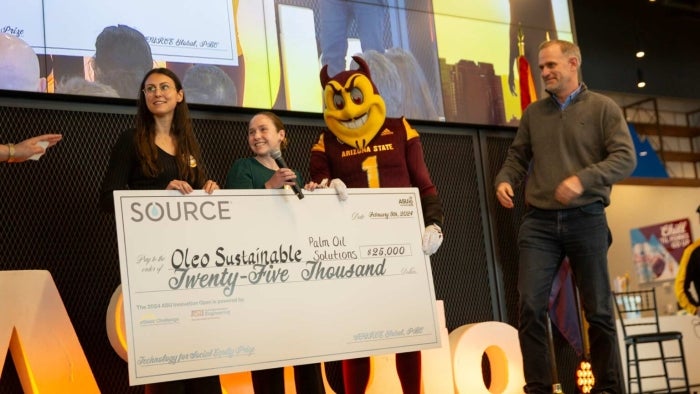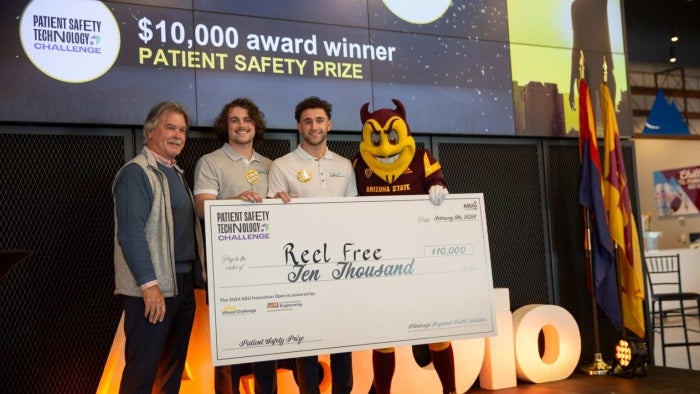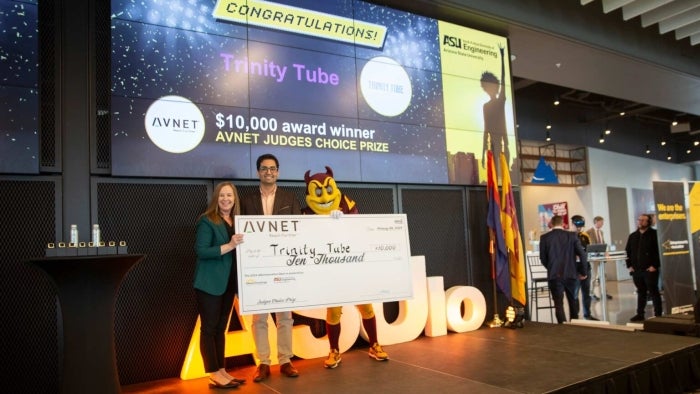ASUio sparks innovation inferno among student entrepreneurs

Student entrepreneurs celebrate their success at the ASU Innovation Open, where nearly $400,000 was distributed to eight ventures tackling environmental, health care and energy challenges. Photo by Erika Gronek/ASU
Innovation, accessibility and sustainability took center stage at the 2024 Arizona State University Innovation Open. Technology innovation and entrepreneurship were on full display at the event, known as ASUio, as 26 teams of students representing 25 universities converged on Mountain America Stadium in Tempe to compete for a chance to win nearly $400,000 in cash prizes for their ventures.
Hosted by ASU and the Ira A. Fulton Schools of Engineering, the ASUio invites collegiate teams to pitch their ventures to investors, successful startup founders and business leaders from across the Phoenix metropolitan area who support student innovation and the growing entrepreneurial ecosystem in Arizona and beyond.
Teams assembled to pitch their ventures and mingle with other up-and-coming collegiate entrepreneurs eager to make a difference across industries.
Representatives from local businesses and the entrepreneurial community, including Intel, SOURCE Global, Avnet, the Pittsburgh Regional Health Initiative, the Arizona Board of Regents, McKinney, Thumbraise and Pangaea Ventures, showed their support for the ventures.
This year, ASUio provided the most lucrative prize pot of any collegiate pitch event, further cementing its status as a career-changing event.
“This is the eighth ASU Innovation Open, and I’ve had the privilege of being involved from the very beginning,” said Kyle Squires, ASU senior vice provost of engineering, computing and technology and dean of the Fulton Schools.
“In the Fulton Schools, we are intentional about creating opportunities to build this entrepreneurial system,” Squires said. “Whether it’s student venture competitions, research or advancing ideas within our faculty and staff, we pay it forward with these experiences to make better entrepreneurs, engineers and makers. I’ve seen growth in the quality of ventures and the impact of the solutions proposed to lead to breakthroughs.”
Incubating entrepreneurship
As student founders from around the world apply their education to the unpredictable territory of entrepreneurship, few opportunities provide funding without proprietary disputes or sacrificing control to investors.
Tracey Dodenhoff, vice president of entrepreneurship and innovation at ASU Knowledge Enterprise, says that entrepreneurship is a core tenant of the university’s values.
“It’s part of ASU culture to support entrepreneurship and support those who want to make an impact,” Dodenhoff said.
Pitch competitions challenge and advance collegiate student innovators who aim to develop hard-tech ventures, giving founders pathways to actualize their revolutionary ideas.
Cody Friesen, an associate professor and the CEO and founder of SOURCE Global, says that the technology that evolved into his award-winning company was developed and incubated in the Fulton Schools labs. Friesen was a key player in establishing ASUio and conceptualized the event with engineering leaders.
Nader Shakerin, a technical program manager at Intel and a first-time judge for the 2024 competition, says Phoenix’s developing reputation within the semiconductor industry is inspiring a chain reaction of sustainable innovations across industries.
“Focusing on sustainability can impact and enable other businesses to create sustainable solutions,” Shakerin said.
Michael Collins, senior director and a clinical assistant professor of health care innovation for the Edson College of Nursing and Health Innovation, says the event built his confidence in the next generation of thinkers.
“As a university, ASU puts a lot of value in how we can help students make a difference," Collins said. "Though many of the founders are not clinicians or in patient-facing roles, they’ve developed engineering designs that show a strong understanding of patient needs. These ideas are already helping patients.”
Connecting within the community
Roy Stillwell, a 2022 winner, returned to ASUio to deliver a public pitch with a board of local investors. He explained the journey behind his company NearWave and its AI-integrated biomedical imaging tool that helps physicians select the right therapy for breast cancer treatment.
Investors and audience members engaged in a Q&A session about the nuances of business growth, obtaining FDA approval and Stillwell’s experiences obtaining funding.
The burgeoning founders were also treated to a fireside chat with Fulton Schools alumnus Tom Prescott, sponsor of the Prescott Student Venture Fund and former CEO and chairman of Align Technology, the world’s third-largest 3D-printing company and producer of orthodontic product Invisalign, and Joe Hogan, former CEO of GE Healthcare and Prescott’s successor at Align Technology.
Prescott has been an influential supporter of his alma mater over the past decade and has been instrumental in developing several programs promoting entrepreneurship within the Fulton Schools.
Prescott and Hogan discussed the importance of building a team with relevant skills that adapt to the market, including Prescott’s experience recruiting Hogan. They analyzed the nuances of cash flow, intellectual property, product development and novel design, and emphasized their value regardless of operation scale. The duo advised founders to remain open-minded about feedback and pivoting, even if it means starting over.
The keynote speech from Mara Aspinall, partner at Illumina Ventures and professor at ASU's College of Health Solutions, expanded on the value of failure and pivoting, emphasizing its value as a learning experience.
Aspinall guided the room through her career’s greatest accomplishments and failures, saying that it is vital to understand why a failure occurs as well as what a founder’s role may have been in the failure.
“The more you innovate, the less you know,” Aspinall said. “The thought of failure creates fear and the reality of failure creates opportunity. Embrace failure for what it can teach.”
Honoring the innovators
$100,000 ASU Innovation Prize
The $100,000 ASU Innovation Prize was awarded to ATOMICS for their molecular-based data storage methods using chemical engineering. Co-founded by Brown University chemistry doctoral students Dana Biechele-Speziale and Selahaddin Gumus, the venture seeks to revolutionize data storage using small molecules.
Data centers are struggling to keep up with the explosive rates of data creation. ATOMICS provides a more dense, sustainable and cost-effective alternative to current data storage practices, which occupy thousands of acres dedicated to data storage across the world. They plan to use the funding to build out their engineering team and scale up production.
$100,000 ASU eSeed Pay It Forward Prize
Somnair, co-founded by Johns Hopkins University engineering graduate student Mitchell Turley, received the $100,000 eSeed Pay it Forward Prize, courtesy of the Prescott Student Venture Fund, for their neuromodulating device to treat obstructive sleep apnea, or OSA.
OSA occurs when the throat muscles relax and block the airway. The disorder affects approximately one in eight people globally, but current treatments are disruptive and invasive for patients, ultimately inhibiting treatment efficiency. To combat this, Somnair designed a mouthguard-inspired device that stimulates the palate and throat to open the airway during sleep.
While giving the award, Prescott praised the venture’s disruptive ideas showing a clear path toward business and big markets.
$50,000 ASU Innovation Prize
Oxylus, founded by Yale graduate students Perry Bakas, Conor Rooney and Harrison Meyer, received the $50,000 ASU Innovation Prize for their novel work in carbon conversion technology by converting carbon dioxide into drop-in green chemicals and feedstocks.
Their methods convert carbon dioxide into green methanol, an energy alternative that doesn't pollute emissions. The Oxylus team is charting a path to integrate cheap, scalable and circular carbon conversion into high-value products to decarbonize current industrial operations.
As a Fulton Schools undergraduate alumnus, Meyer is proud to continue building on his undergraduate education and have his efforts recognized by his alma mater.
$50,000 ASU Innovation Prize
BreatheEV, founded by ASU business data analytics senior Max Bregman, was awarded the $50,000 ASU Innovation Prize for its reservation-based scheduling software that aims to ensure vehicle-charging accessibility.
Bregman’s venture provides reservation software for electric-vehicle charging stations to support the burgeoning infrastructure demand for electric vehicles to ensure sustainable alternatives remain accessible.
Bregman developed this groundbreaking software in collaboration with the J. Orin Edson Entrepreneurship + Innovation Institute.
$45,000 Intel Water Prize
Ecobrew, founded by University of Alabama graduate student Brian Henderson, received the $45,000 Intel Water Prize for innovating sustainable methods for alcohol fermentation.
Breweries use massive quantities of carbon dioxide to carbonate beer, which is promptly released into the atmosphere. Henderson’s venture allows breweries to capture the carbon dioxide that is emitted naturally throughout fermentation, cutting costs to manufacturers and drastically decreasing greenhouse gas emissions to make alcohol production self-sufficient.
$25,000 SOURCE Technology for Social Equity Prize
Oleo Sustainable Palm Oil Solutions received the $25,000 SOURCE Technology for Social Equity Prize. Stanford University engineering graduate students and co-founders Gabriella Dweck and Kelly Redmond designed a process for converting wasted biomass into sustainable palm oil alternatives. As the most widely used vegetable oil in the world, there have been massive amounts of greenhouse gas emissions and deforestation to keep up with demand. Oleo aims to disrupt the $66 billion industry and end palm oil-driven deforestation.
Cody Friesen, CEO and founder of SOURCE Global, connected to the venture through his personal experience providing his water filtration methods to countries with major forest systems wiped out due to the palm oil industry.
$10,000 PRHI Patient Safety Prize
The $10,000 Patient Safety Prize from Pittsburgh Regional Health Initiative was awarded to Reel Free for their oxygen tubing retraction device. The company was founded by Michigan State University brothers Alexander Pollack and Austin Pollock, who designed their product for their grandfather after he tripped on his oxygen tube and got a concussion. They later realized there was a market demand for preventing falls for patients and health care workers.
Dr. Dave Mayer, a founding executive director emeritus of the MedStar Institute for Quality Safety, spoke highly of the product’s market potential.
“Falls are a major issue for patients and health care workers,” Mayer says. “We need this and we need it soon.”
$10,000 Avnet Judges Choice Prize
The $10,000 Avnet Judges’ Choice Prize went to Trinity Tube, co-founded by the University of Texas at Austin mechanical engineering student Iman Salafian, to manage the many devices involved in monitoring, feeding and respiratory support for premature babies. Current procedures include as many as 20 tubes to keep track of, can agitate the baby’s skin and impede its ability to eat and breathe. Trinity Tube is a minimally invasive multifunctional gastric feeding tube that simplifies this nuanced process.
Salafian says the money will help develop their prototype and advance through the regulatory process. He appreciates the help his mentors have given him and is eager to take on the challenges ahead.
More Business and entrepreneurship

Honoring 2 decades of entrepreneurial impact on a global scale
Thunderbird for Good, the impact-driven initiative of Thunderbird School of Global Management at Arizona State University, is marking two decades of educational programs and initiatives dedicated to…

ASU and GoDaddy launch Student Athlete Venture Studio
In a groundbreaking initiative aimed at empowering college athletes beyond their playing careers, Arizona State University and GoDaddy teamed up to launch the first-of-its-kind Student Athlete…

Boosting entrepreneurship to meet the market's needs
America loves an entrepreneur — the home run king of all businesspeople.And at Arizona State University, we love them, too.Here’s a look at how ASU prepares business students, alumni, development…


